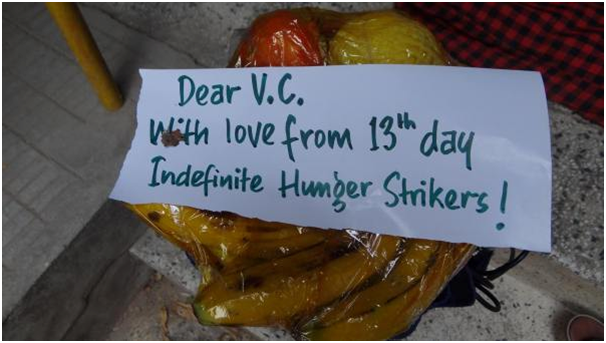What Are Vice Chancellors Made Of?

NEW DELHI: When Vice Chancellor Mamidala Jagadesh Kumar dissolved the Academic Council meeting, and virtually fled, in what was fairly unprecedented in Jawaharlal Nehru University a slightly modified version of that old nursery rhyme ‘what are little boys made of made of, snips and snails and puppy dogs tails…” suddenly came to mind for what initially appeared to be an unfathomable reason. But a short pause clarified the brain cells logic,as clearly what JNU and some other central universities---fortunately not all--- are now grappling with is authoritarian Vice Chancellors, whose concerns have shifted from the welfare of students to an undeclared ‘agenda’ where students and faculty of political viewpoints differing from the ruling party’s are targeted.
What happened inside the meeting of the JNU Academic Council attended by the senior faculty members, representatives of affiliated institutions, and the four student leaders of JNUSU demonstrates the growing polarisation inside this internationally acclaimed centre of learning. The Vice Chancellor instead of moving to end this polarisation, and to restore peace and normalcy in the campus, broken since the police assault in February, has decided----as in Hyderabad Central University, as in the Film and Television Institute, Pune---to stay away from the students on hunger strike now for two weeks against draconian punishment meted out to even those who had nothing to do with the meeting on Afzal Guru.
The AC meet started with faculty members insisting that the hunger strike of the students, that has put their health in serious danger, should be included in the agenda and discussed as the first point. Senior Professors well acclaimed for their academic proficiency tried to persuade the Vice Chancellor to take up the issue. He refused even as the faculty pointed out that it was imperative for him as the VC to intervene, to speak with the students, to review the harsh punishment meted out to them, and to give them relief. JNUSU President Kanhaiya Kumar spoke against the draconian punishment. As did Rama Naga who presented fruits and flowers to the VC with, “We have been on an hunger strike for 13 days but the V-C did not come to meet us even once. We may not be able to eat, but at least you can eat this.” Shehla Rashid was stopped by the security guards from entering the meeting, and finally managed even as a ABVP student spoke at the AC meet describing faculty members also as “anti national.”
After 40 minutes the VC agreed to allow a short discussion on the issue. But then refused all suggestions for an immediate resolution of the issue when the faculty insisted that this should be done without wasting any more time. The students on hunger strike, one of whom fainted outside the AC venue where students had gathered shouting slogans and singing songs, have become the concern for the faculty but clearly not for the VC who has not even once walked down to meet and speak with them. When the faculty members refused to budge, the Vice Chancellor closed the meeting and walked off amidst a battery of security guards.
The majority of the AC, 52 members, amazed at the rigidity on display passed a resolution stating, The overwhelming sense expressed in the academic council meeting held on May 10th, 2016 is that the whole range of punishments meted out to students is excessive and that the harsher punishments such as rustication, suspension, banishment from campus and exorbitant fines should be immediately revoked.
We are distressed by the fact that no deference was shown by the Chair to the opinion of the AC members, and that the Chair adjourned the meeting abruptly and unreasonably.
We, the members of the Academic Council, resolve that all unreasonable punishments for the February 9th incident are revoked.
We resolve that the VC immediately implement this resolution.”
As several Professors pointed out later, the VC is helping the ruling party polarise the normally free, invigorating campus; spreading fear and making the students insecure; disrupting normal academic life through draconian measures such as the heavy fines imposed on the students and the rustication; and refusing to take any steps to alleviate the situation. In the past too, JNU has imposed fines on meetings held by students without permission but these have been to the tune of Rs 2000-3000, and not the Rs 20,000 slapped on students coming from economically deprived households and living off fellowships.
The VC is following the measures taken by the Hyderabad Central University counterpart that had led to Rohith Vemula’s death. Despite this the HRD Ministry has reinstated the then Vice Chancellor Appa Rao with protesting students again being arrested by the police. Appa Rao was also in the news shortly after on allegations of plagiarism that he finally admitted to saying it was “unintentional.”
In JNU the faculty and the students opposing what they now describe this “dictatorship” is strong, and hence able to resist the efforts of the VC to impose an agenda whereby the free democratic space that characterised this campus is turned into a regulated, authoritarian mould with the VC and through him the government prevailing. Delegations, letters, statements from eminent scholars have been ignored in the effort to control this campus where thought has been allowed to prevail, over authority and diktat.



